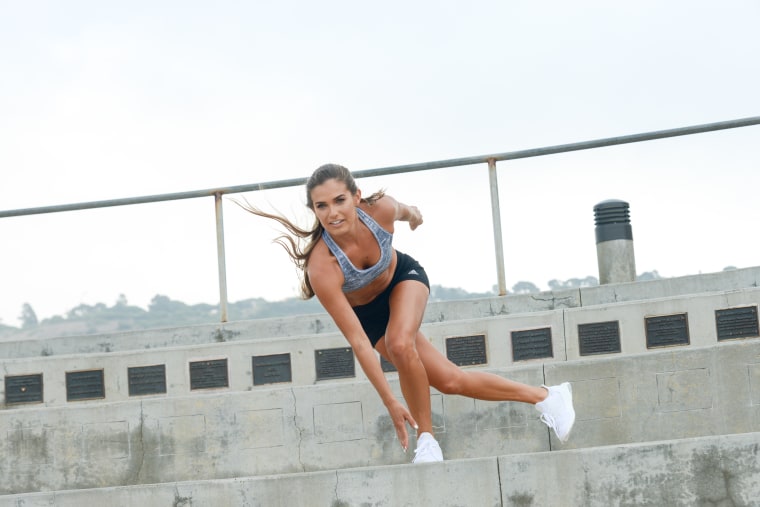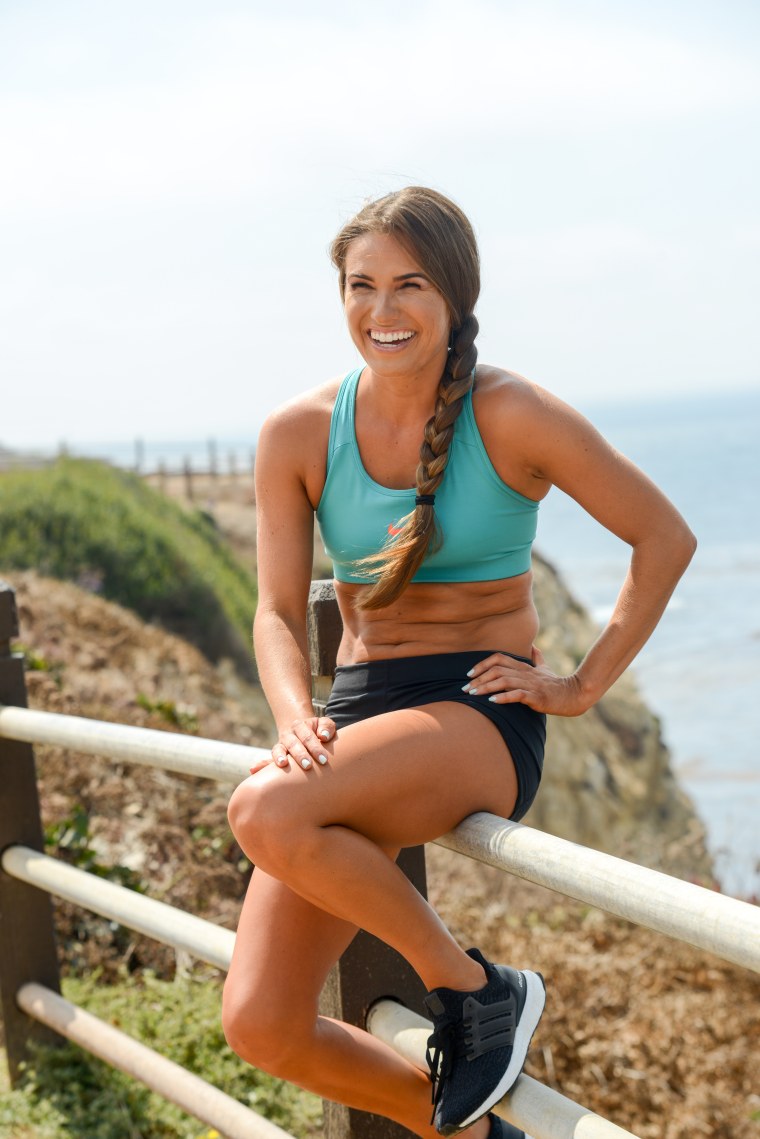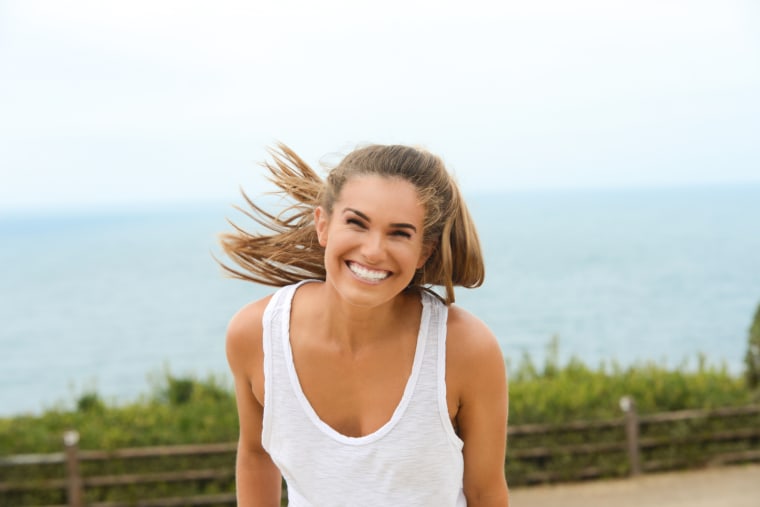My dedication to fitness is fueled by a cold reality: my health depends on it.
It didn’t start out that way, though. I grew up in an incredibly active family where fitness was never an obligation to me — it was a way of life. I played school sports, softball and volleyball competitively, devoting up to five hours per day to them. But my active lifestyle came to an abrupt halt when I was seventeen and woke up with severe stomach pain and nausea. Initially, my parents and I assumed it was a stomach bug. But it didn't pass. Each day, I lived in pain. Eating aggravated the condition, so I began to cut my intake. Within months, I went from being an active, happy teenager to a person unable to get out of bed. As an athlete, I knew that I needed food to fuel my body. But my body was rejecting most food. Food had become my enemy.
Within months, I went from being an active, happy teenager to unable to get out of bed.
I went from specialist to specialist, hospital to hospital, to search for the cause of my pain. My symptoms worsened. My doctors were baffled.
Maybe it’s an ulcer? No.
Perhaps a tumor? No.
Is she celiac? No.
Crohn’s or colitis? No and no.
I was desperate for an answer. I endured endless medical tests and experimental treatments. No one knew what or why. Then, a few agonizing months later came a test and a diagnosis. Gastroparesis.
There are a variety of causes including diabetes or a virus. It rarely afflicts the young. Doctors never pinpointed the cause of my affliction.
Gastroparesis paralyzes the stomach, making it impossible to digest solid foods and condemning victims to a lifetime of small, liquid meals and bouts of severe nausea and vomiting. It also triggers a feeling of fullness after eating only small portions.
My diagnosis was bittersweet. I was grateful to finally have an answer after a long year, but treatment is limited. I experimented with a plethora of oral medications, most of which provided little relief and massive side effects. At one point, I was prescribed a medication normally reserved for severely ill cancer patients. When that failed to work, my parents began importing another medication from Canada because it had been banned in the United States. My doctors told me that I would likely never be able to eat solid food again. I was put on a liquid diet, with few calories, nutrients or fiber.

After treatments at Cedars Sinai in Los Angeles proved futile, my family and I decided to travel 2,000 miles to the world-renowned Mayo Clinic in Minnesota for answers. But shortly before my visit, I received life-changing advice from Dr. Afshine Emrani, a Los Angeles based cardiologist who was one of the doctors treating me at the time. He told me that I had probably staved off the disease for years because of my active life. He noted that my condition deteriorated after my active, athletic school lifestyle ended. Emrani said: “Studies show that exercise aids the digestive system. Fight through the pain and vomiting and exercise as often and rigorously as possible.”
That advice made sense: Gastroparesis inhibits the stomach from emptying properly, and as the Mayo Clinic says, “exercise can help improve the efficiency of the digestive process.”
So I reluctantly started working with a trainer. I had always enjoyed being active, but now I was so weak that it was painful to engage in any type of athletic activity. Five-pound dumbbells felt like fifty and I felt fatigued after one set. My trainer began incorporating pool workouts because it was easier on my body. It was agonizing, but I kept at it. And it worked.
By the time I arrived at the Mayo Clinic, I had improved. I had gained some strength and appetite. And I was able to eat certain solid foods, so long as the portions were small and I chewed slowly and thoroughly. I spent a week at the Mayo Clinic, undergoing tests and meeting with the world’s leading doctors. Then, I received shocking results. While I still had major stomach issues, doctors could see encouraging digestive changes.
My stomach was emptying more normally. The doctors were ecstatic. My exercise regimen had worked. Not all was perfect, of course. I still had serious digestive issues — a lack of stomach elasticity and expansion after consumption caused pain and fullness. My doctor told me to avoid medications and to treat the condition by managing my portions, eating healthy foods (including fiber) and exercising. No more experimental medicines flown in from other countries.
So I shelved the bag of medicines and my interest in healthy living grew. I attended yoga classes, took long walks and jogged. When I saw that our college gym was hiring students to work as personal trainers, I applied and was hired. I became an AFAA certified personal trainer, and committed to helping people achieve their fitness goals. I explored other forms of fitness, too. I trained for half marathons and completed three. I experimented with heavy lifting and fell in love with squatting and dead-lifting. And I taught myself how to swim properly, long distances. After college, I became a certified yoga instructor, an Ironman triathlete and an endurance runner.

I have learned many lessons since my medical journey began: Stay positive and never give up. Be your own medical advocate. Do your own research and inform yourself. You know your body better than any doctor and they need your help in order to help you.
As cliché as it sounds, there is a lesson to be learned — and something to be gained — from what seem to be the darkest of situations. This disease and journey led me to find my passion in life: health, fitness and helping others. They say everything happens for a reason. Sometimes you must persist and keep moving forward to find your silver lining.
Dempsey Marks is a certified personal trainer, yoga teacher and co-founder of PreGame Fit. You can follow her on Instagram.
GET MORE WORKOUT MOTIVATION
- How to lose weight, according to personal trainers
- 'How I learned to love my body through yoga'
- Why exercising with a crowd supercharges your workout
- What it's like to start your day with a dance party
- The health benefits of losing just 5 percent of your body weight
Want more tips like these? NBC News BETTER is obsessed with finding easier, healthier and smarter ways to live. Sign up for our newsletter and follow us on Facebook, Twitter and Instagram.

